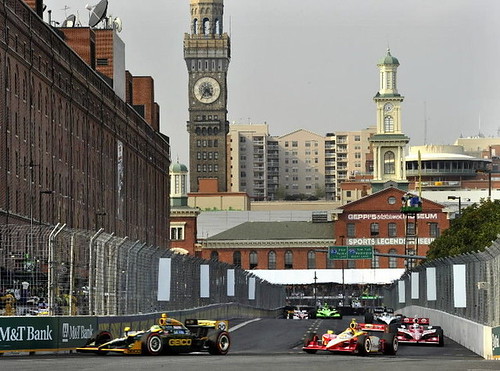 Image: Super Bowl Village, Indianapolis. Rendering from the Indianapolis Convention and Visitors Authority.
Image: Super Bowl Village, Indianapolis. Rendering from the Indianapolis Convention and Visitors Authority.Victor Matheson, a professor at the College of Holy Cross, who studies the economic impact of sports, was featured in the National Public Radio "Planet Money" report on Friday. The segment is "
Is Holding the Superbowl Worth It?":
[Matheson] argues that the NFL claims of economic payback from Super Bowls are vastly overstated. Also, the cost to build a new stadium, while an existing one's debt remains, is high, as is the case in Indianapolis (and would be in San Diego) and he says that's something to think hard about. (Indianapolis raised its hotel, food and beverage and taxi taxes to pay the cost.)
And here are some links to papers that Matheson has written that touch on various aspects of the subject:
In the podcast, Matheson makes a point that I always make about hotel and restaurant revenues generated by such events, that because the companies are typically owned by nonlocal groups such as hotel real estate investment trusts, much of the money generated by such events doesn't stay in the local economy.
To get a sense of the scale of local preparation and the various activities developed by the local convention and visitors bureaus to leverage an event like the Super Bowl, this article from the
International Business Times, "
Super Bowl 2012: Indianapolis Invites Visitors for Weeklong Celebration," is a good one.
I also mention other "big sports events" because I've been meaning to write about the Grand Prix in Baltimore, held over Labor Day Weekend in September 2011.
Baltimore Grand Prix 2011. Baltimore Sun photo.
First the coverage was fawning, about how so many people came out and what a success it was. And I was going to write about this event being an exception to the "rule" that big sports events like this tend to not have the impact that is touted.
Then reports surfaced that the company was having a hard time paying its bills, and then couldn't. Finally, the City of Baltimore yanked the "franchise" the group had received to hold future Grand Prix events in the city. Now the City is considering what group to choose to continue the event ("
Groups vie to run Baltimore Grand Prix in 2012,"
Baltimore Sun).
From "
Culture of secrecy hid Grand Prix's failure" in the
Baltimore Sun:
The embarrassing and unfortunate financial failure of the Baltimore Grand Prix was caused by a pervasive culture of secrecy and privilege within City Hall and at Baltimore Racing Development.
Had more facts been available to the press and the public, it would have been abundantly clear that the race was in jeopardy even in its earliest planning phases. The failure to secure a lead sponsor was, in retrospect, a body-blow that should have led to the race's cancellation or postponement.
Instead, a small group of insiders within BRD and City Hall reassured the race's political sponsors that everything was in hand. And within city government, I was told, people with dissenting opinions about the race were eventually no longer invited to meetings.
Propagandists and politicians use an over-reliance on secrecy to shape popular opinion and suppress dissent. But the success or failure of the Grand Prix was not a matter of opinion; it was a matter of financial facts. And the facts show that as a business proposition, it was a dismal failure — ultimately indebted for more than $12 million and having snubbed multiple creditors, including the city, state, and multiple small businesses.
Labels: public finance and spending, sports and economic development, stadiums/arenas, tourism, urban revitalization
 Image: Super Bowl Village, Indianapolis. Rendering from the Indianapolis Convention and Visitors Authority.
Image: Super Bowl Village, Indianapolis. Rendering from the Indianapolis Convention and Visitors Authority.



1 Comments:
Really informative blog article.Really thank you!
Post a Comment
<< Home